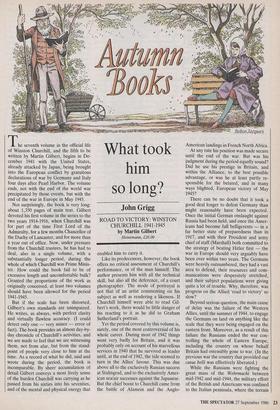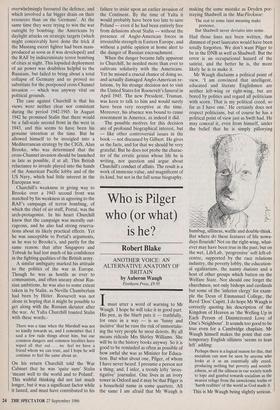What took him so long?
John Grigg
ROAD TO VICTORY: WINSTON CHURCHILL 1941-1945 by Martin Gilbert Heinemann, f20.00 The seventh volume in the official life of Winston Churchill, and the fifth to be written by Martin Gilbert, begins in De- cember 1941 with the United States, already attacked by Japan, being brought into the European conflict by gratuitous declarations of war by Germany and Italy four days after Pearl Harbor, The volume ends, not with the end of the world war precipitated by those events, but with the end of the war in Europe in May 1945.
Not surprisingly, the book is very long: about 1,350 pages of main text. Gilbert devoted his first volume in the series to the two years 1914-1916, when Churchill was for part of the time First Lord of the Admiralty, for a few months Chancellor of the Duchy of Lancaster, and for more than a year out of office. Now, under pressure from the Churchill trustees, he has had to deal, also in a single volume, with a substantially longer period, during the whole of which Churchill was Prime Minis- ter. How could the book fail to be of excessive length and uncomfortable bulk? Granted the proportions of the work as originally conceived, at least two volumes should have been allowed for the period 1941-1945 But if the scale has been distorted, Gilbert's own standards are unimpaired. He writes, as always, with perfect clarity and virtually flawless accuracy. (I could detect only one — very minor — error of fact). The book provides an almost day-by- day-chronicle of Churchill's activities, and we are made to feel that we are witnessing them, not from afar, but from the stand- point of people very close to him at the time. As a record of what he did, said and wrote during the period, the book is incomparable. By sheer accumulation of detail Gilbert conveys a most lively sense of the burden Churchill was carrying as he passed from his sixties into his seventies, and of the mental and physical energy that enabled him to carry it.
Like its predecessors, however, the book offers no critical assessment of Churchill's performance, or of the man himself. The author presents him with all the technical skill, but also all the deference, of a court photographer. The mode of portrayal is not that of an artist commenting on his subject as well as rendering a likeness. If Churchill himself were able to read Gil- bert's work, there would be little danger of his reacting to it as he did to Graham Sutherland's portrait.
Yet the period covered by this volume is, surely, one of the most controversial of his whole career. During most of 1942 things went very badly for Britain, and it was probably only on account of his marvellous services in 1940 that he survived as leader until, at the end of 1942, the tide seemed to turn in the Allies' favour. This was due above all to the exclusively Russian success at Stalingrad, and to the exclusively Amer- ican sea/air successes against the Japanese. But the chief boost to Churchill came from the battle of Alamein and the Anglo- American landings in French North Africa.
At any rate his position was made secure until the end of the war. But was his judgment during the period equally sound? Did he use his prestige in Britain, and within the Alliance, to the best possible advantage, or was he at least partly re- sponsible for the belated, and in many ways blighted, European victory of May 1945?
There can be no doubt that it took a good deal longer to defeat Germany than might reasonably have been expected. Once the initial German onslaught against Russia had been held, and once the Amer- icans had become full belligerents — in a far better state of preparedness than in 1917, and with their President and army chief of staff (Marshall) both committed to the strategy of beating Hitler first — the war in Europe should very arguably have been over within two years. The Germans were heavily outnumbered, they had a vast area to defend, their resources and com- munications were desperately stretched, and their subject populations were giving quite a lot of trouble. Why, therefore, was progress on the Allied 'road to victory' so slow?
Beyond serious question, the main cause of delay was the failure of the Western Allies, until the summer of 1944, to engage the Germans on land on anything like the scale that they were being engaged on the eastern front. Moreover, as a result of this failure the Russians ended the war con- trolling the whole of Eastern Europe, including the country on whose behalf Britain had ostensibly gone to war. (In the previous war the country that provided our casus bell was effectively liberated.) While the Russians were fighting the great mass of the Wehrmacht between mid-1942 and mid-1944, the military effort of the British and Americans was confined to the Italian peninsula, where the terrain overwhelmingly favoured the defence, and which involved a far bigger drain on their resources than on the Germans'. At the same time they were trying to win the war outright by bombing: the Americans by daylight attacks on strategic targets (which might conceivably have done the trick if the Mustang escort fighter had been mass- produced as soon as it was developed) and the RAF by indiscriminate terror bombing of cities at night. This lopsided deployment of air power was doubtless helpful to the Russians, but failed to bring about a total collapse of Germany and so proved no substitute for the postponed cross-Channel invasion — which was anyway vital on political grounds.
The case against Churchill is that his views were neither clear nor consistent during the period 1942-1945. In August 1942 he promised Stalin that there would be a full-scale second front in the west in 1943, and this seems to have been his genuine intention at the time. But he allowed himself to be inveigled into a Mediterranean strategy by the CIGS, Alan Brooke, who was determined that the cross-Channel invasion should be launched as late as possible, if at all. This British reluctance to invade played into the hands of the American Pacific lobby and of the US Navy, which had little interest in the European war.
Churchill's weakness in giving way to Brooke over a 1943 second front was matched by his weakness in agreeing to the RAF's campaign of terror bombing, of which the chief of air staff, Portal, was the arch-protagonist. In his heart Churchill knew that the campaign was morally out- rageous, and he also had strong reserva- tions about its likely practical effects. Yet he was susceptible to Portal's arguments, as he was to Brooke's, and partly for the same reason: that after Singapore and Tobruk he had lost much of his confidence in the fighting qualities of the British army.
A similar ambiguity marked his attitude to the politics of the war in Europe. Though he was as hostile as ever to communism, and often uneasy about Rus- sian ambitions, he was also to some extent taken in by Stalin, as Neville Chamberlain had been by Hitler. Roosevelt was not alone in hoping that it might be possible to get along with the Russian dictator after the war. At Yalta Churchill toasted Stalin with these words:-
There was a time when the Marshall was not so kindly towards us, and I remember that I said a few rude things about him, but our common dangers and common loyalties have wiped all that out . . . we feel we have a friend whom we can trust, and I hope he will continue to feel the same about us.
On his return Churchill told the War Cabinet that he was 'quite sure' Stalin `meant well to the world and to Poland'. This wishful thinking did not last much longer, but it was a significant factor while it lasted, and must have contributed to his failure to insist upon an earlier invasion of the Continent. By the time of Yalta it would probably have been too late to save Poland — even if he had been entirely free from delusions about Stalin — without the presence of Anglo-American forces in irresistible strength in Eastern Europe, and without a public opinion at home alert to the danger of Russian encroachment.
When the danger became fully apparent to Churchill, he needed more than ever to cultivate solidarity with the Americans. Yet he missed a crucial chance of doing so, and actually damaged Anglo-American re- lations, by his strange decision not to visit the United States for Roosevelt's funeral in April 1945. The new President, Truman, was keen to talk to him and would surely have been very receptive at the time. Moreover, his absence was bound to cause resentment in America, as indeed it did.
The possible motives for this decision are of profound biographical interest, but — like other controversial issues in the book — not discussed by Gilbert. He gives us the facts, and for that we should be very grateful. But he does not probe the charac- ter of the erratic genius whose life he is writing, nor question and argue about Churchill's conduct of affairs. The result is a work of immense value, and magnificent of its kind, but not in the full sense biography.



























































 Previous page
Previous page